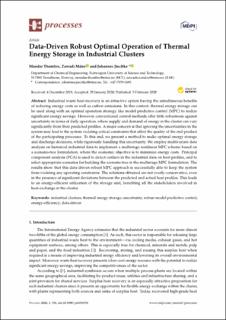| dc.contributor.author | Thombre, Mandar | |
| dc.contributor.author | Mdoe, Zawadi Ntengua | |
| dc.contributor.author | Jäschke, Johannes | |
| dc.date.accessioned | 2022-05-02T13:28:16Z | |
| dc.date.available | 2022-05-02T13:28:16Z | |
| dc.date.created | 2020-10-06T13:55:58Z | |
| dc.date.issued | 2020 | |
| dc.identifier.citation | Processes. 2020, 8 (2), 1-24. | en_US |
| dc.identifier.issn | 2227-9717 | |
| dc.identifier.uri | https://hdl.handle.net/11250/2993683 | |
| dc.description.abstract | Industrial waste heat recovery is an attractive option having the simultaneous benefits of reducing energy costs as well as carbon emissions. In this context, thermal energy storage can be used along with an optimal operation strategy like model predictive control (MPC) to realize significant energy savings. However, conventional control methods offer little robustness against uncertainty in terms of daily operation, where supply and demand of energy in the cluster can vary significantly from their predicted profiles. A major concern is that ignoring the uncertainties in the system may lead to the system violating critical constraints that affect the quality of the end-product of the participating processes. To this end, we present a method to make optimal energy storage and discharge decisions, while rigorously handling this uncertainty. We employ multivariate data analysis on historical industrial data to implement a multistage nonlinear MPC scheme based on a scenario-tree formulation, where the economic objective is to minimize energy costs. Principal component analysis (PCA) is used to detect outliers in the industrial data on heat profiles, and to select appropriate scenarios for building the scenario-tree in the multistage MPC formulation. The results show that this data-driven robust MPC approach is successfully able to keep the system from violating any operating constraints. The solutions obtained are not overly conservative, even in the presence of significant deviations between the predicted and actual heat profiles. This leads to an energy-efficient utilization of the storage unit, benefiting all the stakeholders involved in heat-exchange in the cluster. | en_US |
| dc.language.iso | eng | en_US |
| dc.publisher | MDPI | en_US |
| dc.rights | Navngivelse 4.0 Internasjonal | * |
| dc.rights.uri | http://creativecommons.org/licenses/by/4.0/deed.no | * |
| dc.title | Data-Driven Robust Optimal Operation of Thermal Energy Storage in Industrial Clusters | en_US |
| dc.title.alternative | Data-Driven Robust Optimal Operation of Thermal Energy Storage in Industrial Clusters | en_US |
| dc.type | Peer reviewed | en_US |
| dc.type | Journal article | en_US |
| dc.description.version | publishedVersion | en_US |
| dc.source.pagenumber | 1-24 | en_US |
| dc.source.volume | 8 | en_US |
| dc.source.journal | Processes | en_US |
| dc.source.issue | 2 | en_US |
| dc.identifier.doi | 10.3390/pr8020194 | |
| dc.identifier.cristin | 1837621 | |
| dc.relation.project | Norges forskningsråd: 257632 | en_US |
| cristin.ispublished | true | |
| cristin.fulltext | original | |
| cristin.qualitycode | 1 | |

